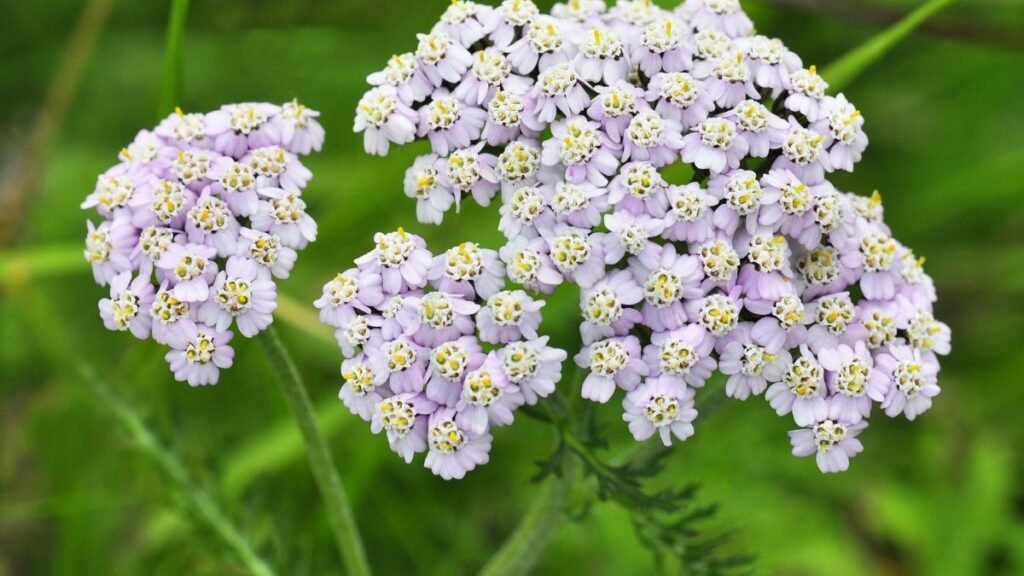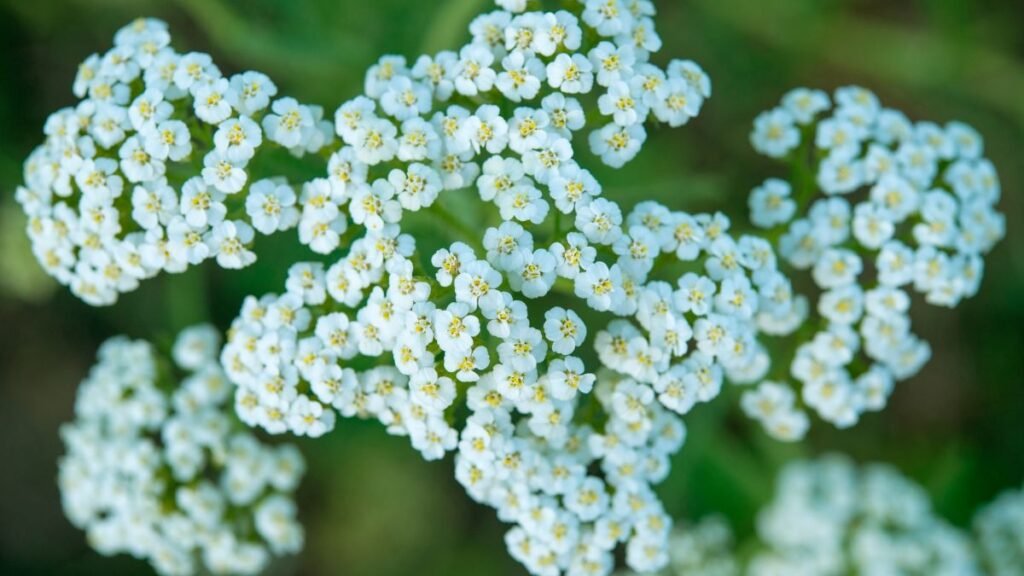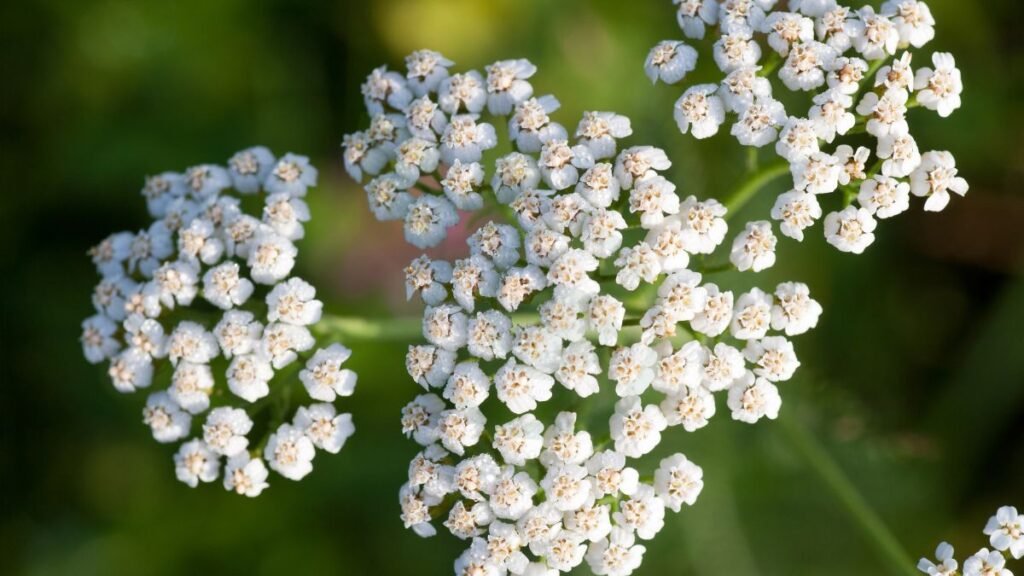Yarrow is renowned for its numerous health benefits. From its ability to alleviate digestive issues to its potential to boost the immune system, yarrow, an herbal medicine, offers a range of wellness advantages. Whether consumed as a tea, applied topically as an oil, or taken in supplement form, yarrow, an herbal medicine, can promote overall health and well-being.
Yarrow, scientifically known as Achillea millefolium, possesses a myriad of health benefits from its leaves and flowers. Rich in antioxidants and anti-inflammatory compounds, yarrow can aid in digestion, reduce inflammation, and promote cardiovascular health. Additionally, it may help alleviate symptoms of menstrual cramps and improve skin conditions such as eczema and acne. Yarrow's antimicrobial properties also make it beneficial for wound healing and immune support.
Discover the holistic benefits of yarrow and incorporate this versatile herb into your wellness routine to experience its remarkable effects firsthand. Explore the various ways to integrate yarrow into your diet and skincare regimen, and unlock its potential to support your overall health and vitality.
Key Takeaways
- Yarrow (Achillea millefolium) offers various health benefits, including skin care applications, respiratory relief, cardiovascular health support, women's health benefits, stress and anxiety reduction.
- Incorporate yarrow into your skincare routine for its healing and anti-inflammatory properties, aiding in conditions like eczema and acne.
- Yarrow can provide respiratory relief by acting as an expectorant, helping to clear congestion and ease breathing.
- Enhance cardiovascular health by consuming yarrow, which may help regulate blood pressure and improve circulation.
- Women can benefit from yarrow for menstrual issues and menopausal symptoms due to its hormonal balancing effects.
- Manage stress and anxiety naturally with yarrow's calming properties, promoting relaxation and emotional well-being.
Yarrow Overview

Historical Uses
Yarrow has a rich history of traditional medicinal uses dating back centuries. It was used by ancient Greeks to treat wounds on battlefields due to its hemostatic properties. Native American tribes utilized yarrow for various ailments, including fevers and gastrointestinal issues. It was believed to have protective powers against negative energy.
Plant Characteristics
Yarrow is a perennial herb with feathery leaves and clusters of small white or pink flowers. It typically grows up to three feet tall and thrives in sunny locations with well-drained soil. The plant is known for its hardiness and ability to attract beneficial insects like ladybugs and parasitic wasps to gardens.
Active Compounds
The health benefits of yarrow can be attributed to its diverse array of active compounds, including flavonoids, alkaloids, and tannins. These compounds contribute to yarrow's anti-inflammatory, antispasmodic, and antimicrobial properties. The presence of chamazulene in yarrow essential oil gives it its distinctive blue color and enhances its effectiveness in promoting skin healing.
Health Benefits

Wound Healing
Yarrow's antibacterial and anti-inflammatory properties make it effective in promoting wound healing. It helps reduce inflammation, prevent infections, and speed up the healing process.
The herb can be used topically as a poultice or salve to treat minor cuts, scrapes, and burns. Its astringent qualities help to stop bleeding by promoting blood clotting, aiding in the quick closure of wounds.
Digestive Health
Yarrow is beneficial for digestive health due to its ability to stimulate appetite, improve digestion, and reduce bloating. It acts as a mild bitter tonic, enhancing the production of digestive enzymes and bile.
The herb can be consumed as a tea to alleviate indigestion, gas, and bloating. Yarrow's carminative properties help soothe gastrointestinal discomfort and promote overall digestive wellness.
Anti-Inflammatory Effects
Yarrow exhibits potent anti-inflammatory effects, making it useful in managing various inflammatory conditions such as arthritis and muscle pain. Its compounds help reduce swelling and alleviate pain.
By inhibiting inflammatory pathways in the body, yarrow can provide relief from joint stiffness, swelling, and discomfort. Regular consumption of yarrow tea or tincture can help manage chronic inflammatory conditions effectively.
Immune Support
Yarrow is known for its ability to boost the immune system due to its antioxidant properties. It helps protect the body from oxidative stress and strengthens immune responses against infections.
The herb contains compounds that support the body's natural defense mechanisms against pathogens. Consuming yarrow regularly can enhance overall immunity and reduce the risk of common illnesses.
Skin Care Applications

Acne Treatment
Yarrow's anti-inflammatory properties make it effective in treating acne by reducing redness and inflammation. Its antibacterial qualities help fight acne-causing bacteria, promoting clearer skin. Yarrow can be used topically as a natural remedy for acne.
Scar Diminishing
Yarrow's ability to promote tissue regeneration aids in diminishing scars. It helps the skin heal faster, reducing the appearance of scars over time. Applying yarrow oil directly to scars can accelerate the healing process.
Eczema Relief
For individuals suffering from eczema, yarrow's anti-inflammatory and calming effects can provide relief. It soothes irritated skin, reduces itching, and helps restore the skin's natural barrier function. Using yarrow-infused creams or lotions can alleviate eczema symptoms effectively.
Respiratory Relief
Cold Symptoms
Yarrow can help alleviate cold symptoms such as congestion and coughing. Its anti-inflammatory properties reduce inflammation in the respiratory tract, easing breathing. Yarrow's antiviral effects combat viruses causing colds, aiding recovery.
The herb acts as a natural decongestant, clearing nasal passages and reducing mucus production. Yarrow tea or steam inhalation can provide quick relief from nasal congestion. Its diaphoretic properties induce sweating, helping the body expel toxins and fight infections.
Allergy Management
Yarrow is beneficial for managing allergies due to its anti-allergenic properties. It inhibits histamine release, reducing allergic reactions like sneezing and itching. Consuming yarrow tea or tincture can help alleviate allergy symptoms naturally.
The herb's anti-inflammatory effects also soothe inflamed airways during allergic reactions, promoting easier breathing. Yarrow's immune-boosting properties strengthen the body's defenses against allergens, minimizing allergic responses.
Cardiovascular Health
Blood Pressure Regulation
Yarrow contains compounds that help regulate blood pressure by dilating blood vessels, promoting better circulation. This can aid in reducing the risk of hypertension and related cardiovascular issues.
The herb's ability to relax blood vessels contributes to maintaining optimal blood pressure levels, preventing spikes that can strain the heart. Yarrow also supports overall heart health by improving circulation and enhancing nutrient delivery throughout the body.
Circulation Improvement
By enhancing blood flow, yarrow promotes efficient oxygen and nutrient transport to all parts of the body. Improved circulation supports cellular function and overall organ health.
Yarrow's role in improving circulation can have a positive impact on various cardiovascular conditions, such as reducing the risk of blood clots and supporting healthy heart function.
Women's Health
Menstrual Relief
Yarrow has been traditionally used to alleviate menstrual cramps and regulate menstrual cycles naturally. It contains compounds that reduce uterine spasms, easing discomfort during menstruation.
Studies suggest that yarrow can help balance hormones and reduce heavy bleeding, making it a valuable herb for menstrual health.
Menopausal Support
For women going through menopause, yarrow can provide relief from symptoms such as hot flashes, night sweats, and mood swings. Its phytoestrogenic properties help in managing hormonal fluctuations.
Yarrow also supports bone health during menopause by increasing calcium absorption and promoting overall well-being in this transitional phase of life.
Stress and Anxiety Reduction
Yarrow offers calming effects that can help alleviate stress and anxiety in individuals. The plant contains compounds that interact with the body's neurotransmitters, promoting relaxation and reducing feelings of tension. Yarrow's anti-anxiety properties make it a natural remedy for those seeking relief from daily stressors.
The calming effects of yarrow extend to improving sleep quality as well. By reducing stress and anxiety levels, yarrow can help individuals achieve a more restful night's sleep. This herb acts as a mild sedative, aiding in relaxation and promoting a sense of calmness before bedtime. Incorporating yarrow into your nightly routine may lead to improved sleep patterns over time.
Calming Effects
- Yarrow provides natural relief from stress and anxiety.
- Compounds in yarrow interact with neurotransmitters to promote relaxation.
Sleep Improvement
- Yarrow's calming properties extend to enhancing sleep quality.
- Incorporating yarrow into your routine can aid in achieving a restful night's sleep.
Nutritional Profile
Vitamins and Minerals
Yarrow is rich in vitamins like vitamin C, which boosts the immune system and promotes skin health. It also contains vitamin K, essential for blood clotting and bone health. Yarrow provides minerals such as potassium for heart function and calcium for bone strength.
The plant's abundance of iron supports oxygen transport in the body, aiding energy levels and preventing anemia. Yarrow also offers magnesium, crucial for muscle function and relaxation. These vitamins and minerals collectively contribute to overall health and well-being.
Antioxidant Content
Yarrow boasts a significant amount of flavonoids, powerful antioxidants that combat oxidative stress in the body. These compounds help reduce inflammation, lower the risk of chronic diseases, and protect cells from damage. The presence of polyphenols in yarrow further enhances its antioxidant properties.
The antioxidants found in yarrow play a vital role in promoting cardiovascular health by reducing cholesterol levels and supporting healthy blood pressure. They also aid in maintaining skin elasticity, slowing down the aging process, and protecting against environmental toxins.
Safe Usage and Considerations
Dosage Guidelines
Yarrow is typically consumed as a tea, tincture, or capsule. Dosages vary based on the form used. For yarrow tea, steep 1-2 teaspoons of dried yarrow flowers in hot water for 5-10 minutes. Consuming more than the recommended dosage may lead to adverse effects.
When using yarrow tinctures, the standard dose is 30-60 drops diluted in water up to three times daily. Capsules usually contain around 400-500 mg of yarrow extract each. It's crucial to follow the instructions on the product label or consult a healthcare professional for personalized advice.
Possible Interactions
Yarrow may interact with certain medications and health conditions. Avoid combining yarrow with blood-thinning medications like warfarin due to potential interactions. Individuals with allergies to plants in the Asteraceae family should also steer clear of yarrow.
If you are pregnant or breastfeeding, it's advisable to consult a healthcare provider before using yarrow products. Yarrow may stimulate uterine contractions and cause complications during pregnancy. Always prioritize safety and seek professional guidance when unsure about potential interactions.
Side Effects
While generally safe when used appropriately, yarrow can cause side effects in some individuals. Common side effects include skin irritation upon contact with fresh yarrow leaves or flowers. Allergic reactions such as rashes or respiratory issues may occur in sensitive individuals.
Excessive consumption of yarrow can lead to digestive disturbances like nausea, vomiting, or diarrhea. If you experience any adverse reactions after consuming yarrow products, discontinue use immediately and seek medical attention if symptoms persist.
Closing Thoughts
Incorporating yarrow into your daily routine can offer a myriad of health benefits. From skincare to stress reduction and cardiovascular support, this versatile herb packs a powerful punch. Remember to consider its safe usage and consult with a healthcare professional if needed before integrating it into your wellness regimen. Embrace the natural goodness of yarrow and unlock its potential to enhance your overall well-being.
Take the next step towards a healthier lifestyle by exploring the wonders of yarrow. Share this valuable information with others who could benefit from its properties. Make yarrow a staple in your self-care routine and experience the positive impact it can have on your health and vitality.
Frequently Asked Questions
What are the key health benefits of yarrow?
Yarrow offers various health benefits, including skin care support, respiratory relief, cardiovascular health promotion, women's health enhancement, stress and anxiety reduction, and a rich nutritional profile.
Is yarrow safe for consumption and what considerations should be kept in mind?
Yarrow is generally safe when consumed in moderation. However, individuals with allergies to plants like ragweed or marigolds should avoid yarrow. Pregnant and breastfeeding women should consult a healthcare provider before using yarrow.
How can yarrow be used for skin care applications?
Yarrow is beneficial for skin health due to its anti-inflammatory and antimicrobial properties. It can be used in skincare routines to help soothe irritations, reduce redness, and promote overall skin wellness.
In what ways does yarrow contribute to respiratory relief?
Yarrow acts as a natural expectorant and can help alleviate symptoms of respiratory issues such as coughs and congestion. Its anti-inflammatory properties may also aid in soothing respiratory discomfort.
What role does yarrow play in promoting cardiovascular health?
Yarrow is known to support cardiovascular health by potentially helping regulate blood pressure levels and promoting healthy circulation. Its antioxidant properties may also contribute to overall heart health maintenance.
Image Source: Paid image from CANVA



